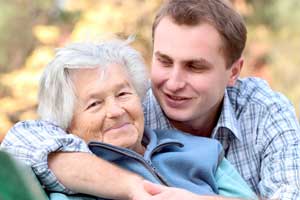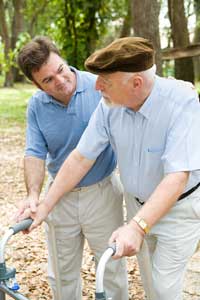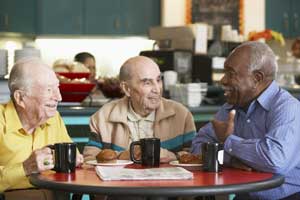 Anxiety is an intense feeling of uncertainty, unease and
fear or sense of being out of control. Some individuals with anxiety have occasional panic attacks in which they also experience palpitations and shortness of breath. Often people seeking help for panic attacks report feeling they are about to die,
go crazy or lose control. Some individuals develop a compulsion to engage in certain behaviours to reduce their anxiety.
Anxiety is an intense feeling of uncertainty, unease and
fear or sense of being out of control. Some individuals with anxiety have occasional panic attacks in which they also experience palpitations and shortness of breath. Often people seeking help for panic attacks report feeling they are about to die,
go crazy or lose control. Some individuals develop a compulsion to engage in certain behaviours to reduce their anxiety.
People with chronic disabilities are more likely to experience anxiety than the population as a whole, probably because they have more to be anxious about. The most common causes of anxiety are:
- Fear of the consequences of the illness or disability (e.g., death, paralysis, dementia, functional limitations)
- Fear of losing control of life and circumstances
- Fear of becoming dependent or being at the mercy of the health care system or others
- Concern over the financial future of the family, particularly dependent children
- Intense feelings of loss with regard to the envisioned future, family stability or income
- Concerns about one’s appearance and the reactions of family members, friends and other acquaintances
- Fear of appearing in public places and being stared at or pitied
- Post-traumatic stress around places or events associated with the onset of the disability
In general, people with chronic disabilities that follow an uncertain degenerative pattern are more likely to have anxiety about the future because it is so unpredictable. Their condition may remain stable or improve for a time, or they may continue to decline in function; no one can say what will happen, when or why.
 It can be difficult for caregivers to assess the emotional state of
their loved one because many feelings may be present simultaneously. It is common for individuals with chronic disabilities to feel both anxious and depressed - and sometimes angry as well. In addition to the usual causes of these emotions, sometimes
anxiety (or depression) can be a side effect of medications.
It can be difficult for caregivers to assess the emotional state of
their loved one because many feelings may be present simultaneously. It is common for individuals with chronic disabilities to feel both anxious and depressed - and sometimes angry as well. In addition to the usual causes of these emotions, sometimes
anxiety (or depression) can be a side effect of medications.
Signs of anxiety include:
- Physical changes – e.g., difficulty falling asleep or staying asleep, changes in appetite
- Mood changes – e.g., irritability, nervousness, tearfulness, inability to stop worrying, mood swings
- Thinking changes – e.g., difficulty paying attention, wondering if efforts are worth it
Individuals may not be prepared to talk about their feelings for a variety of reasons. Talking about fears may make them feel weak. They may believe that talking will make them feel more anxious, or that they will feel more hopeless after discussing their anxieties than before.
You may also feel anxious as a caregiver and share some of the same fears about the future as your loved one. If you initiate a discussion using a positive, problem-solving approach, your loved one may be willing to talk about the situation and consequently help ease some of your anxiety. Some additional strategies are listed in the next tab.

Challenge faulty thinking
Jointly challenge your assumptions about the future. Sometimes they are based on faulty thinking. For example, while a physical decline in MS is (currently) inevitable, many personal and environmental factors (e.g., room temperature) that slow the progression can be controlled. You can also create plans for how to advocate with systems, build stability and a circle of support.
Develop self-coping statements
Once individuals recognize that their faulty thoughts raise their anxiety level, they can learn to stop those thoughts before anxiety builds and replace them with more rational thoughts. With practice, the rational statements become an automatic response when anxiety occurs. As a caregiver, you can help your loved one find rational statements to repeat - at first aloud, and then silently - that counteract the irrationality of the feelings and thoughts and replace them with other thoughts or coping activities. Here are some examples:
- “Right now I have some feelings I don’t like. They will be over soon and I will be fine. I am going to focus on doing something more active.”
- “I’ve stopped my negative thoughts before and I can do it again now. I will think about something that makes me happy instead.”
- “So I feel a little anxious now. So what? It’s not the first time. I will take some deep breaths and keep on going.”
Coping statements can also be used to prepare for a stressful situation. Here are some examples:
- “When this is over, I will be glad that I did it.”
- “I’ve done this before, so I know I can do it again.”
More examples of self-coping statements can be found at http://www.anxietynetwork.com/content/coping-statements-anxiety.
Address social anxiety with action
Social anxiety - whether it’s about being stared at in public or the reactions of friends and others - can be addressed directly. Why does it matter if a stranger pities you? Do you want to educate the public to be more accepting of diversity? Would it reduce your loved one’s anxiety if you spoke to family members or friends in advance of a visit as to how the loved one wants to be treated or what topics of conversation are OK or not OK?

Develop a relaxation response
Physical symptoms of anxiety, including those of panic attacks, can be reduced by learning ways to relax on demand. Encourage your loved one to regularly practise relaxation exercises. In addition to the stress-relieving activities in Module 3, here are some additional links to relaxation or breathing exercises that may be appropriate for you and/or your loved one:
- How to Alleviate Panic Attacks: How to do breathing exercises (video)
- Deep Breathing Exercise (video)
Exercise
Physical activity is an effective way to deal with anxiety and other negative emotions. There is no single reason why exercise reduces anxiety. It could be that the repetitive nature of certain exercises acts like meditation to calm the mind, or that exercising gives the person a needed feeling of control. The heightened physiological arousal and alertness that exercise produces may help to alleviate anxiety. Or the effect may be due to something else entirely. Regardless of how it works, it works.
Distraction and redirection
Sometimes a person can dwell on negatives so that anxiety builds until it becomes overwhelming. As a caregiver, you may recognize the signs that your loved one is dwelling on negative thoughts. You may be able to break the downward spiral by providing a distraction or initiating a conversation that redirects your loved one’s attention to other matters.
You may find a combination of techniques useful in helping your loved one (or yourself) with anxiety.